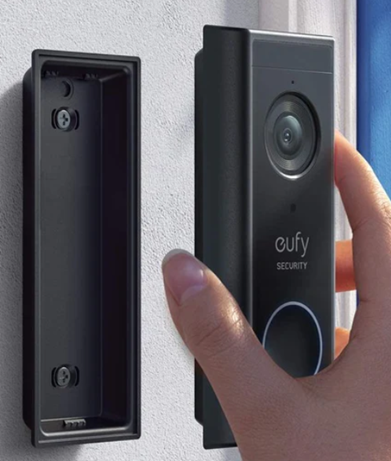In the realm of home security, doorbell
cameras have become indispensable tools for homeowners seeking to enhance
surveillance, monitor activity, and ensure peace of mind. When considering a
doorbell camera for your home, one of the primary decisions you'll need to make
is whether to opt for a wireless or wired model. Both types offer unique
advantages and considerations, so let's explore the key differences between
wireless and wired doorbell cameras:
Installation
Process:
One of the most significant differences
between wireless and wired doorbell cameras lies in their installation process.

- Wireless Doorbell Cameras: Wireless
models are designed for easy installation and typically require minimal tools
and expertise. They operate on batteries or rechargeable power sources,
eliminating the need for complex wiring. Wireless doorbell cameras can be
mounted virtually anywhere near the front door, providing flexibility and
convenience in placement.
- Wired Doorbell Cameras: In contrast,
wired doorbell cameras require a more involved installation process due to the
need for wiring to connect the camera to the home's electrical system or
existing doorbell wiring. This may require professional installation to ensure
proper wiring and functionality. While wired cameras offer a more permanent
solution, the installation process can be more labor-intensive and
time-consuming.
Power Source:
Another key difference between wireless and
wired doorbell cameras is their power source:
- Wireless Doorbell Cameras: Wireless
models rely on batteries or rechargeable power sources for operation. While
this eliminates the need for wiring and provides flexibility in placement, it
also requires regular maintenance to monitor battery levels and ensure
continuous operation. Some wireless models may offer solar-powered options for
extended battery life.
- Wired Doorbell Cameras: Wired models are
powered by the home's electrical system or existing doorbell wiring. This
provides a reliable power source and eliminates the need for battery
replacement or recharging. However, it may require professional installation to
connect the camera to the electrical system, and power outages could affect
functionality.
Connectivity
and Range:
Connectivity and range are important
considerations when choosing between wireless and wired doorbell cameras:
- Wireless Doorbell Cameras: Wireless
models rely on Wi-Fi connectivity to transmit video feeds and notifications to
your smartphone or other devices. While wireless technology offers flexibility
and convenience, it may be susceptible to signal interference or connectivity
issues, particularly in areas with poor Wi-Fi coverage.
- Wired Doorbell Cameras: Wired models are
typically hardwired to the home's electrical system or existing doorbell
wiring, providing a stable and reliable connection. Wired cameras may offer
better connectivity and range compared to wireless models, making them suitable
for larger properties or areas with Wi-Fi limitations.
Features and
Functionality:
Both wireless and wired doorbell cameras
offer a range of features and functionality to enhance home security:

- Wireless Doorbell Cameras: Wireless
models often come equipped with high-definition video recording, motion
detection, two-way audio communication, and night vision capabilities. They may
also offer cloud storage options for storing recorded footage and accessing
remote viewing capabilities.
- Wired Doorbell Cameras: Wired models
similarly offer advanced features such as high-definition video recording,
motion detection, and two-way audio communication. They may also integrate
seamlessly with existing home security systems and offer local storage options
for recorded footage.
Conclusion:
In conclusion, the choice between wireless doorbell camera and
wired doorbell cameras ultimately depends on your specific needs, preferences,
and home environment. Wireless models offer easy installation, flexibility in
placement, and portability, making them ideal for renters or those seeking a
DIY solution. On the other hand, wired models provide a reliable power source,
stable connectivity, and seamless integration with existing home systems,
making them suitable for homeowners looking for a more permanent solution with
enhanced features and functionality. Consider your home's layout, power source
availability, connectivity requirements, and desired features when selecting
the right doorbell camera for your home. By understanding the differences
between wireless and wired doorbell cameras, you can make an informed decision
that meets your security needs and provides peace of mind for you and your
family.
